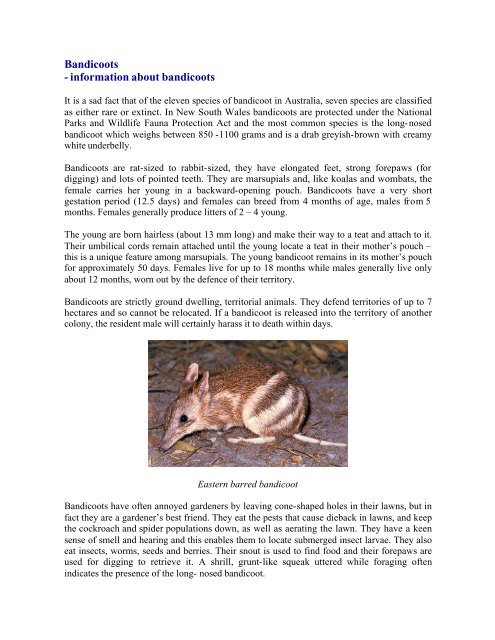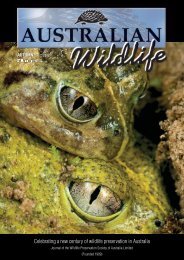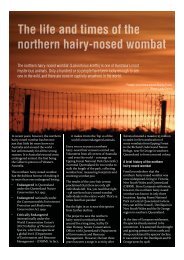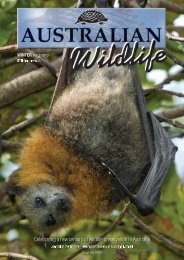Bandicoots - Wildlife Protection Society of Australia
Bandicoots - Wildlife Protection Society of Australia
Bandicoots - Wildlife Protection Society of Australia
Create successful ePaper yourself
Turn your PDF publications into a flip-book with our unique Google optimized e-Paper software.
<strong>Bandicoots</strong><br />
- information about bandicoots<br />
It is a sad fact that <strong>of</strong> the eleven species <strong>of</strong> bandicoot in <strong>Australia</strong>, seven species are classified<br />
as either rare or extinct. In New South Wales bandicoots are protected under the National<br />
Parks and <strong>Wildlife</strong> Fauna <strong>Protection</strong> Act and the most common species is the long-nosed<br />
bandicoot which weighs between 850 -1100 grams and is a drab greyish-brown with creamy<br />
white underbelly.<br />
<strong>Bandicoots</strong> are rat-sized to rabbit-sized, they have elongated feet, strong forepaws (for<br />
digging) and lots <strong>of</strong> pointed teeth. They are marsupials and, like koalas and wombats, the<br />
female carries her young in a backward-opening pouch. <strong>Bandicoots</strong> have a very short<br />
gestation period (12.5 days) and females can breed from 4 months <strong>of</strong> age, males from 5<br />
months. Females generally produce litters <strong>of</strong> 2 – 4 young.<br />
The young are born hairless (about 13 mm long) and make their way to a teat and attach to it.<br />
Their umbilical cords remain attached until the young locate a teat in their mother’s pouch –<br />
this is a unique feature among marsupials. The young bandicoot remains in its mother’s pouch<br />
for approximately 50 days. Females live for up to 18 months while males generally live only<br />
about 12 months, worn out by the defence <strong>of</strong> their territory.<br />
<strong>Bandicoots</strong> are strictly ground dwelling, territorial animals. They defend territories <strong>of</strong> up to 7<br />
hectares and so cannot be relocated. If a bandicoot is released into the territory <strong>of</strong> another<br />
colony, the resident male will certainly harass it to death within days.<br />
Eastern barred bandicoot<br />
<strong>Bandicoots</strong> have <strong>of</strong>ten annoyed gardeners by leaving cone-shaped holes in their lawns, but in<br />
fact they are a gardener’s best friend. They eat the pests that cause dieback in lawns, and keep<br />
the cockroach and spider populations down, as well as aerating the lawn. They have a keen<br />
sense <strong>of</strong> smell and hearing and this enables them to locate submerged insect larvae. They also<br />
eat insects, worms, seeds and berries. Their snout is used to find food and their forepaws are<br />
used for digging to retrieve it. A shrill, grunt-like squeak uttered while foraging <strong>of</strong>ten<br />
indicates the presence <strong>of</strong> the long- nosed bandicoot.
Although bandicoots usually have ticks, because they happen to live in the same environment<br />
as ticks, the ticks do not harm healthy animals. <strong>Bandicoots</strong> keep tick numbers down through<br />
grooming with their fused double-clawed back feet.<br />
The greatest threat to bandicoot survival is from cats and foxes. Many are killed by motor<br />
vehicles and land clearing is also reducing their habitat and placing strain on the populations.<br />
The natural habitat <strong>of</strong> the bandicoot includes long grass or low shrubs. Being nocturnal, the<br />
long-nosed bandicoot spends the day in its nest – which is a shallow hole in the ground, lined<br />
with grasses and leaves.<br />
If you do come across a dead bandicoot, always check (as with all marsupials) to see if it has<br />
a pouch. Injured females <strong>of</strong>ten eject their young so check around the female for any young<br />
that could be hiding under grass or nearby.<br />
Southern brown bandicoot





